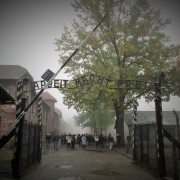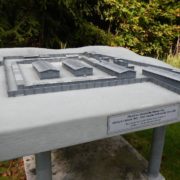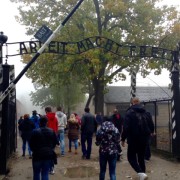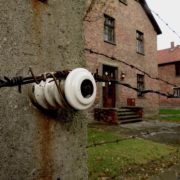A Museum of Memory
By: Jake “Andy” Fabrizio
In the days leading up to our study tour of Auschwitz-Birkenau, I was filled with a unique type of apprehension. What I was anxious for, I could not quite put my finger on; though I had been excited for almost all of our excursions, I knew that there was going to be something different about this one. I could at least understand where my apprehension stemmed from. Mainstream media and education drills a simple equation into our head: “Holocaust = Auschwitz”. Visiting this camp seemed like, and is, a huge deal. During this semester alone, we have visited numerous sites of Nazi crimes and mass murder and discussed the Holocaust and its implications in depth. We heard the stories, read the testimonies, and watched the movies. This next trip, though, it was going to be special. It was Auschwitz– the concentration camp, the go-to name synonymous with the Holocaust. I was convinced that Auschwitz-Birkenau would be the crown jewel of our Holocaust education, that it would answer all of my questions and present us with some classified, newfound knowledge of some sort.
I must admit, in this regard, Auschwitz did not live up to expectations. What I thought was going to be some grand reveal turned out to be nothing of the sort. To my surprise, there was not too much to learn at the camps that we had not already talked about. There were facts, charts, and statistics, but those can be found anywhere. I had wondered why these camps were left intact if they only served such a basic purpose. Wouldn’t it make since to demolish a site of such atrocities and negative energy and just move on? Surely a typical museum building could provide the same information with improved facilities and a less ominous setting. I cannot say that I was uninterested or disappointed, that would not properly capture my emotions, however this famous site was not all what I expected.
As our tour went on, I began to realize that I entirely misjudged the purpose of the camp in its current state. We had studied prior to our visit for a reason. While the museums are intended to educate the visitors and disseminate knowledge, the true purpose of Auschwitz –Birkenau is much less tangible. It is less about cold, hard facts and much more about the preservation of the memory of those who perished and suffered. Once I realized the true intent of the camp, I began to reflect on the events that took place there and remember the victims. In fact, I would argue that the less that you have to learn in terms of history while at the camp, the more you can wholly appreciate the facility for what it is now. Yes, the camp aims to teach, but it is so much more than that. Those who visit and neglect to see past statistics dishonor the memory of the victims.
I now see that leaving the camps in their original form allowed ample opportunity for reconciliation and commemoration. A standard museum building cannot capture the scale of evil that the grounds of a “death factory” can. A museum would not evoke the feeling of horror one is overtaken with when things are put into perspective, and they are told that Auschwitz-Birkenau is one of the largest graveyards in the world. The atrocities cannot be forgotten; they must be remembered so the horror cannot repeat itself. But the people- the men, the women, and children- who were innocent victims of a twisted regime cannot be forgotten either. Most importantly, they cannot be remembered as a statistic in the grand scheme of things, as a small part of millions of deaths. Each life is precious and must be remembered as so.
The brutal past was not hidden, yet the beauty of nature prevailed. I was overwhelmed and surprised at the beauty of nature surrounding the Auschwitz II-Birkenau camp. Never in my life had I encountered such a stark contrast between nature and history. I first found the serenity of the woods odd, unsettling even, but then I began to pause and reflect and remember. Strangely, I felt a type of peace within myself. My mind was clear of everything except that which was right in front of me. Nothing mattered more in that moment than remembering the lives of those lost too soon.
Reevaluating my prior expectations, I realized that were actually completely surpassed but in a different way than imagined. I came into Auschwitz expecting to learn some groundbreaking piece of information. That was naive of me. The camps serve as a symbol of memory and teach more than a textbook could ever be capable of. I did leave with knowledge but not in the form of statistics. The camps helped me to understand that the loss of individuals was the greatest atrocity of the Holocaust. Some died, and some were forever changed. The methods of taking lives, in the scheme of things, do not matter nearly as much as the very fact that innocent lives were taken. Auschwitz stands as a symbol of destruction, death, and chaos, and we must honor each and every fallen individual and not forget that they too were a living, functioning member of society much like us. Adjectives of race, nationality, and gender do no matter; the only adjective that is important is innocent and this cannot be forgotten.







